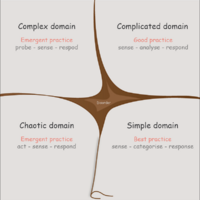The Cynefin Framework
From apppm
(Difference between revisions)
LasseMadsen (Talk | contribs) (→Additional reading) |
LasseMadsen (Talk | contribs) |
||
| Line 1: | Line 1: | ||
[[File:Cynefin_as_of_1st_June_2014.png|200px|thumb|right|The Cynefin Framework]] | [[File:Cynefin_as_of_1st_June_2014.png|200px|thumb|right|The Cynefin Framework]] | ||
| − | This article will introduce the Cynefin framework and its underlying practices, which can be used for sense- and decision making in a complex and complicated world. The framework is developed by David J. Snowden (born 1 April 1954), and is used by leaders to determine operative context so they can make appropriate choices. | + | This article will introduce the Cynefin framework and its underlying practices, which can be used for sense- and decision making in a complex and complicated world. The framework is developed by David J. Snowden (born 1 April 1954), and is used by leaders to determine operative context so they can make appropriate choices. |
| − | The Cynefin framework splits the issues that faces leaders into five contexts; simple, complicated, complex, chaotic and disorder. Each of which requires different approaches to leadership style. | + | |
| + | The Cynefin framework splits the issues that faces leaders into five contexts; <b>simple, complicated, complex, chaotic and disorder</b>. Each of which requires different approaches to leadership style. | ||
Revision as of 23:55, 13 November 2014
This article will introduce the Cynefin framework and its underlying practices, which can be used for sense- and decision making in a complex and complicated world. The framework is developed by David J. Snowden (born 1 April 1954), and is used by leaders to determine operative context so they can make appropriate choices.
The Cynefin framework splits the issues that faces leaders into five contexts; simple, complicated, complex, chaotic and disorder. Each of which requires different approaches to leadership style.
Contents |
History
The Cynefin model
- Simple contexts (known knowns)
- Complicated contexts (known unknowns)
- Complex contexts (unknown unknowns)
- Chaotic contexts (unknowable unknowns)
- Disorder (not determined)
Examples of contexts
- Examples of simple contexts
- Examples of complicated contexts
- Examples of Complex contexts
- Examples of Chaotic contexts
- Examples of Disorder
Examples of uses
Additional reading
- Harvard business review: Snowden, David J., and Mary E. Boone. "A leader's framework for decision making."
- Cynefin 101, an article by Greg Brougham http://www.infoq.com/articles/cynefin-introduction
- The new dynamics of strategy: sense-making in a complex and complicated world http://alumni.media.mit.edu/~brooks/storybiz/kurtz.pdf
- Video: (Youtube): The Cynefin Framework http://www.youtube.com/watch?v=N7oz366X0-8
- Article archive cognitive-edge.com http://cognitive-edge.com/library/more/articles/
